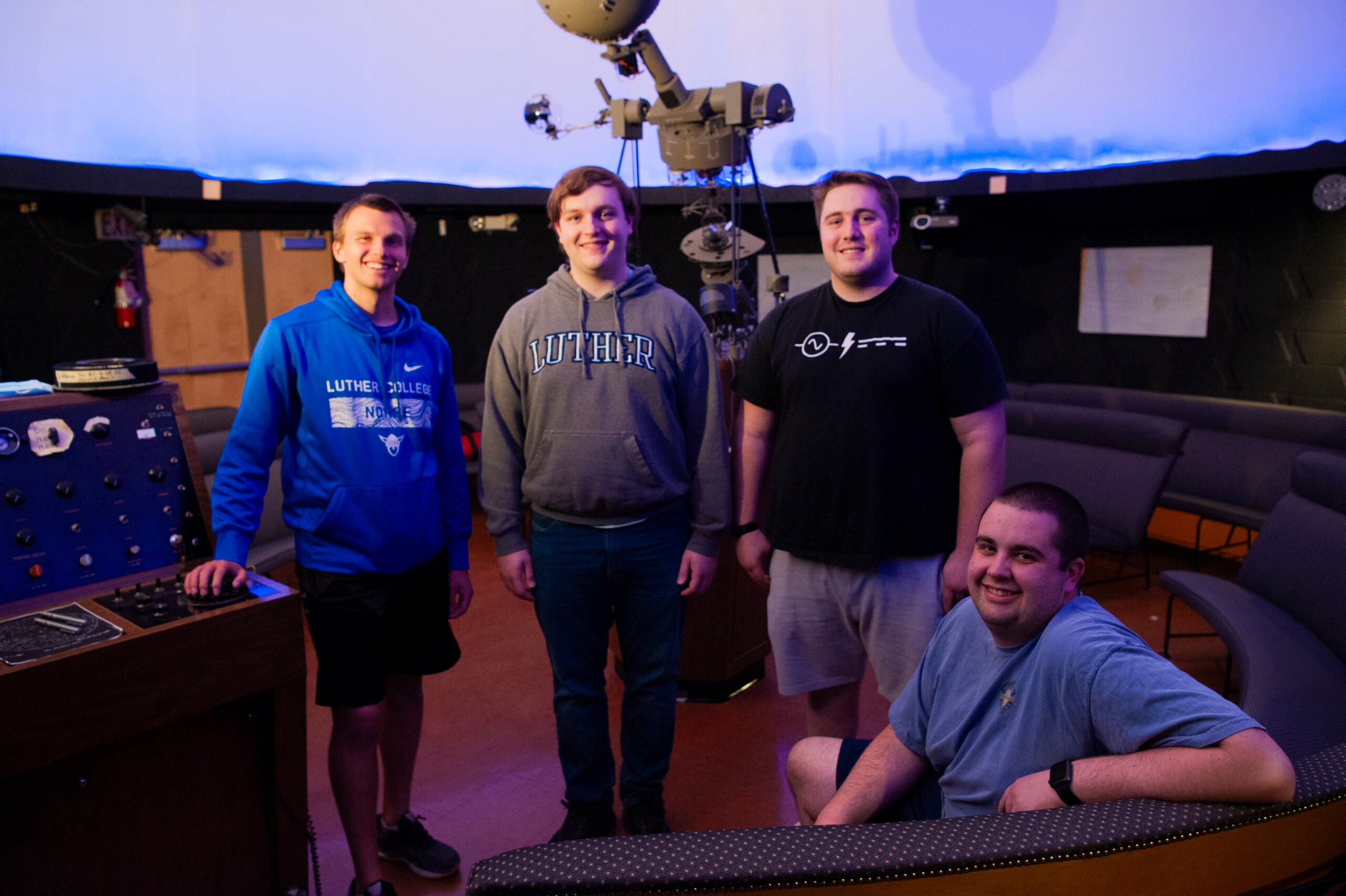Service through Stargazing
Sometimes you meet a group of students dedicated to the pure pursuit of knowledge. Such is the case with four physics majors—double majors, actually, in math and data science—who took over running planetarium shows for Decorah-area students and other groups during their final year at Luther.
Use of the 60-year-old campus planetarium had already been diminishing pre-Covid, but the pandemic brought about a real slump. It had become primarily a space where student clubs watched movies.
In spring 2022, physics professor Jeff Wilkerson suggested that members of Luther’s Society of Physics Students (SPS) take it over. With community outreach as one of their main goals, they jumped at the chance. During the 2022–23 school year, seniors Darren Kremer, Sam Wilson, Kale Altman, and Josh Muller led dozens of shows for kindergartners to adults, sharing the awe and wonder of the night sky—and reaping tons of benefits themselves.

During the 2022–23 school year, seniors (left to right) Darren Kremer, Sam Wilson, Kale Altman, and Josh Muller led dozens of shows for kindergarteners to adults, sharing the awe and wonder of the night sky—and reaping tons of benefits themselves.
Love of Learning
All four of the SPS students were drawn to physics in part because of how it explains the universe. “Physics is the basis of how the world functions around us,” Muller says. “That’s what drew me to it. It allows us to figure out more complex problems.”
The idea of building upon their knowledge base was a major driver for getting involved in planetarium outreach. The students had conducted research through the physics department, but none had studied constellations.
“When this opportunity was presented, the sort of sandbox of intellectual curiosity and the possibility of learning about all these stars and things was absolutely fascinating,” SPS president Kremer says. “I did research with Dr. Wilkerson, so I worked with some of his data on stars, but I didn’t know basic constellations, temperatures of stars, stellar evolution, or any of the things that we’ve been able to learn about.”
Altman says, “Dr. Wilkerson’s wealth of knowledge is kind of insane. And so the more time we spend with him in the planetarium, the better for us, really.”
The planetarium contains a group of ten binders with thousands of projector slides, so the possibilities for shows are endless. The SPS students spent hours learning information for basic shows, how to find constellations in a constantly shifting night sky, and how to operate the equipment. Then they spent more hours practicing.
Bottom line? Making a planetarium show look easy takes a lot of work.
But if the time investment was great, so were the rewards. It’s changed how Wilson notices the night sky when he’s driving, or how Kremer carves out part of his day to intentionally stargaze. It’s opened up Muller’s conception of how much there is to learn. And it’s provided all four of the students with a deeper appreciation of their field of study.
Muller says, “For the four of us, our last couple semesters of physics classes have sometimes been pretty rough, and it’s been really cool to be able to come in here to enjoy the physics rather than be graded on it.”
Sharing Knowledge
Equal to the thrill of learning new knowledge is the thrill of sharing it with others. Kremer says, “When you turn the lights all the way down and really show the band of the Milky Way, that’s probably the most rewarding time. Groups are always blown away by how many stars there are. It’s an awe-inspiring moment.”
Last spring, Altman ran a half-hour show that lasted an hour because of all the questions kids had. “I think it’s really cool to see them exercise that curiosity and muscle the membrane up and figure things out,” he says.
At a show later that same day, a group of second graders asked the following:
How many constellations are there?
How many stars have names?
How many miles is a light year?
How many stars are in our galaxy?
And best of all: Can we do this for longer?
While the SPS students teach others, they’re learning themselves. Wilson says, “It’s a very good exercise in communicating knowledge and tailoring it for a specific audience. I’ve done shows for kindergartners, fifth graders, and fellow physics majors. Just being able to share the same information in three different ways is really instructive.”
Muller makes the point that “As physics majors, we don’t do that many presentations. And most of the presentations we’ve done have been in front of our specialized class of five other people. My last planetarium show had 60 people in the room, so it’s a very different atmosphere.”
Altman agrees: “We can get so into the weeds with things we’re looking at in our classes or work or things, but being able to communicate effectively is just as—if not more—important.”
While building communication skills is a welcome bonus, the biggest payoff of this kind of outreach is sharing wonder, awe, and a humbling shift in perspective. As Muller says, “The vastness of the universe—it’s something that kids can really start to grasp in here.”
This group of four continues to grow their knowledge base, Kremer as an account specialist at Aon Solutions in Chicago; Wilson in a master’s of mechanical engineering program at the University of Illinois at Urbana-Champaign; Altman in a dual master’s program for business analytics and finance at the University of Iowa; and Muller in a PhD program for mechanical engineering at Missouri University of Science and Technology.